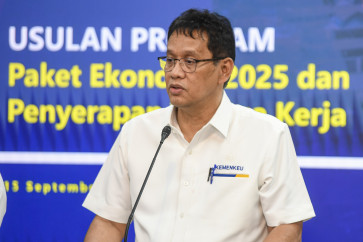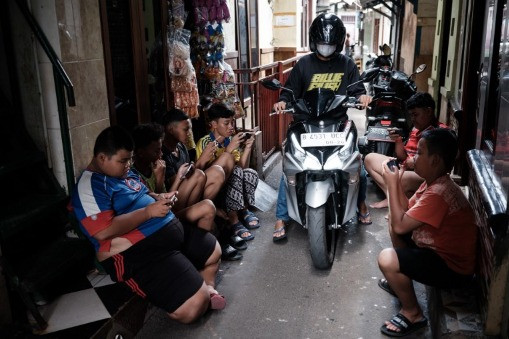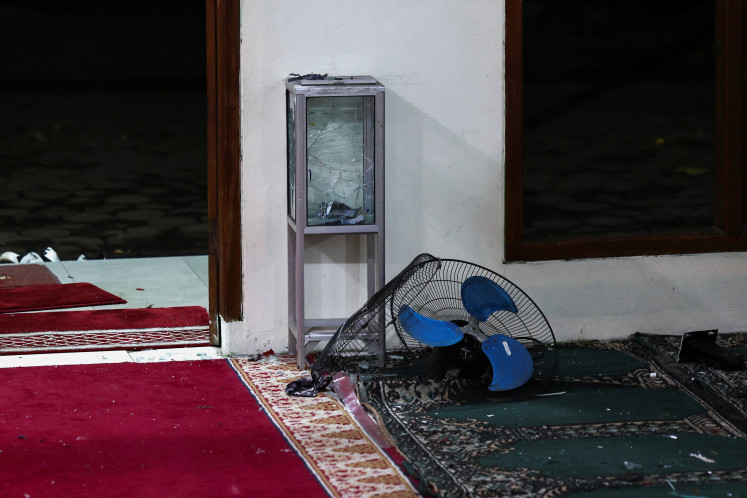Popular Reads
Top Results
Can't find what you're looking for?
View all search resultsPopular Reads
Top Results
Can't find what you're looking for?
View all search resultsObama: Between hope and reality
During last year’s Indonesian presidential campaign, many Indonesians believed that had Obama been one of the contenders he could have easily won the Indonesian election
Change text size
Gift Premium Articles
to Anyone
D
uring last year’s Indonesian presidential campaign, many Indonesians believed that had Obama been one of the contenders he could have easily won the Indonesian election.
He was so popular then, here and outside the US, even exceeding his popularity within his own country. After 22 months in the White House, I very much doubt that Obama, who is due to visit Indonesia this week, is still as popular here today.
He will still be very much welcome by many Indonesians compared to the last visit of his predecessor, when George W. Bush had to jump from one helipad to another especially prepared for him in order to avoid being too close to unfriendly crowds.
But Barack Hussein Obama should not expect to get a reception as warm as that given to the Iranian President during his last visit to Indonesia.
The Muslim world was so hopeful after Obama’s famous “new beginning” and “mutual respect” speech in Cairo and Washington, DC, on the future of US relations with Islamic countries.
Many now feel betrayed after his silence on the indiscriminate Israeli bombing of Gaza, and the US defense of the brutal Israeli attack on the humanitarian flotilla, not to mention the continued American belligerence in Afghanistan and Pakistan.
His failure in pressuring Israel to refrain from building new settlements in the West Bank indicates his impotence when facing the Jewish state. This further erases hope among Muslims of his seriousness to implement his rhetorical promises.
Twice Obama has had to cancel his visits to Indonesia in March and June this year due to more pressing domestic matters. Reactions of his cancellation here varied from fully understanding his excuses to a feeling of exasperation.
However, one thing is certain: The US President could not have easily cancelled a long-planned schedule to visit to a country in a last-minute decision, had the country been on the top list of US’ strategic partners.
An American Indonesianist recently wrote in a local newspaper saying we should not expect too much from Obama’s upcoming visit, as Indonesia is not that strategically important to the US.
It is difficult to disagree with such an observation, as geo-strategically Indonesia, or ASEAN for that matter, ranks much lower than China and India in US efforts to lift its economy out of the current sluggishness.
Geopolitically, America is more interested in dragging Indonesia to its side on suspicion of Chinese intentions in the South China Sea. As home to the largest Muslim population in the world, Indonesia has not been seen as having real potential in contributing to peace efforts in the Middle East.
Being a non-Arab Muslim state and located far from the area, Indonesia is generally regarded by the conflicting parties as a nonentity.
Despite many problems that point to the declining power of the US, America is still a superpower to be reckoned with. Thus America is more important to Indonesia than vice versa.
The Indonesian government, for its part, should take full advantage of the very short visit of Obama to convince the US President that the strengthening of US-Indonesia relations will not only be beneficial for peace and stability in this region but also for America in the long term, as Indonesia’s ambition is to become an emerging economic powers, following those already part of the BRIC grouping.
On the part of Obama, I would humbly suggest that he refrains from making further speeches and promises on US-Islam relations, but concentrates on a real agenda of dialog and cooperation that will benefit both worlds.
Muslim communities here, many welcome and some suspicious of his visit, would rather have Obama listen to their grievances than sit quietly listening to his rhetoric.
His principled support of the controversial building of an Islamic Center near Ground Zero was highly appreciated by Muslims and at the same time learned Muslims understand that it is not easy to turn Obama’s good intentions on the Middle East peace and relations with Islamic countries into reality under the current American political conditions, which are still dominated by a suspicion of Islam and blind support for Israel.
Obama’s belated visit this time has lost some of its momentum. Especially now when Indonesians
are in mourning mode, preoccupied with a string of recent natural disasters.
President Susilo Bambang Yudhoyono would have no doubt preferred to welcome Obama under brighter circumstances. Any remaining sentimental feeling of Obama toward Indonesia as a result of his childhood upbringing in Jakarta and his late mother’s deep empathy for the underprivileged here would do well, only if translated into real actions of mutual benefit.
On his return from the Asian visit, Obama will face a tough Congress as the Republican Party won the midterm election and will soon regain control of the House.
We wish him good luck and may his remaining two years of presidency produce a tougher president with strong determination to realize his famous campaign motto “change we can believe in”.
The writer is the chairman of Mizan Publishers.










